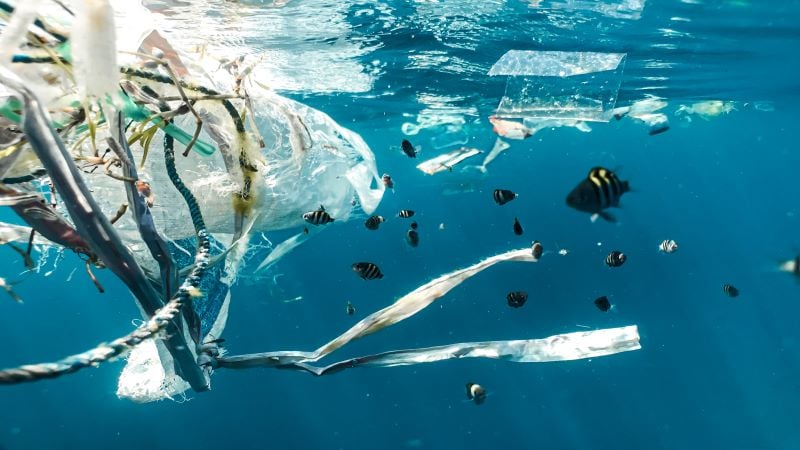This website uses cookies so that we can provide you with the best user experience possible. Cookie information is stored in your browser and performs functions such as recognising you when you return to our website and helping our team to understand which sections of the website you find most interesting and useful.
Fight against plastic pollution goes global as support for UN Plastics Treaty grows

The scale of the plastic pollution problem
In terms of the 86 million tons of plastic packaging alone produced each year, it is estimated that less than less than 14 percent is recycled. Figures for all plastics ever made are just as stark: only 9 per cent of the plastic ever produced has been recycled. Of the rest, 79 per cent sits in landfill or as litter, and the rest has been
incinerated.
Projections from a major 2020 report from Pew Charitable Trusts & SYSTEMIQ 2020 called Breaking the Plastic Wave suggests that if we continue with
the current system, the amount of plastic in the oceans will triple to around
32 million tonnes by 2040. While awareness of our plastic problem has grown recently, its impact has not. Indeed, the covid-19 pandemic has fuelled demand for single use or wrapped consumer items and of course for things like PPE used in the health care sector. Online shopping is also fuelling high volumes of hard to recycle
plastic packaging. In this scenario, only co-ordinated global action, mass behaviour change and policy innovations can chart an alternative course.
Time for a treaty on plastic pollution
Whilst the international community focuses on binding targets for fossil fuel emissions at November’s COP26, no such global ambition currently exists for plastic pollution. But that could be about to change as NGOs and Governments step up calls for a world treaty on plastic waste. At the UN level, over 135 countries have expressed support for an ambitious, international treaty on plastic pollution and over 30 countries are co-sponsoring a motion to open formal talks on drafting a binding international treaty.
The international consumer movement has lent its support for the treaty. With a global network of consumer groups from over 100 countries across the world, Consumers International’s Tackling Plastic Pollution initiative mobilised their 200 strong membership to call on governments to make urgent progress with commitments to global action.
As an active member of Consumers International, Euroconsumers has played a leading role in this work. Our Portuguese organisation Deco Proteste contributed to Consumers International’s global assessment of packaging, in particular plastics, called The Consumer Lens on Packaging; Belgian organisation Test-Aankoop/Test-Achats contributed to the joint UN Environment Programme/Consumers International report Can I Recycle This? which mapped out the confusing array of standards, labels and claims on plastic packaging and recommended a more standardised, simplified approach.
EU Single Use Plastic Directive comes into force
Regional frameworks and rules also have a vital role in reducing plastic pollution. The EU’s Single Use Plastics Directive came into force in July this year, aiming to ban the most commonly found and littered single use plastic items like plates, straws, stirrers and cutlery. Other measures included a 90 per cent collection target on plastic bottles by 2029 and ensuring PET drinks bottles are made up of 25 per cent of recycled plastic by 2025.
Consumers face a maze of confusing plastic choices
While the Single Use Plastics Directive is a step in the right direction, there are still many hurdles to overcome before achieving an innovative, circular and consumer-centered European market. At the moment, consumers face a maze of confusing options if they want to reduce plastic pollution, with invisible microplastics released when we launder our clothes, confusing claims about plastic alternatives and lack of options for recycling. As part of our work to create a market that is Approved by Tomorrow our national organisations are working hard on projects that address and expose the current problems faced by consumers who want to make low-plastic choices:
- Italian organisation Altroconsumo’s analysis of popular bamboo products found many are not as eco-friendly as claimed. Often touted as an ‘ecological’ alternative for single use plastics, bamboo products can contain harmful substances and are not biodegradable or easily recyclable.
- In Belgium, Test-Aankoop/Test-Achats has joined the “Alliance for the bottle deposit” campaigns in order to establish a deposit system for plastic bottles and cans in Belgium. This follows the success of similar schemes in reducing plastic waste and increasing recycling in neighbouring country The Netherlands.
- Spanish organisation OCU is researching and highlighting the growing problem of microplastics in wastewater. Part of the CLEAN project, this research has found a worrying amount of microplastics are being released during each cycle of a washing machine. As 35% of all microplastics in the sea come from washing machine water, this is an important issue that needs to be addressed.
- Deco Proteste in Portugal has extensively tested 96 types of shopping bags, including reusable plastic ones, to find out which ones have the lowest ecological impact and which ones don’t. These choices can help guide us on when it is worthwhile to use reusable or biodegradable plastic – and when it isn’t.
All of these activities show just how much needs to change to enable consumers to be part of the solution to plastic pollution. While legislation banning single use plastics is welcome, we need to go much further than that. We need a market where consumers aren’t being misled with greenwashing claims, where options are based on evidence, where manufacturers lead on reducing the amount of plastic in the system, and where alternatives to plastics are affordable and convenient. We need a market where the planet and consumers are at the centre, a market that is Approved By Tomorrow.


